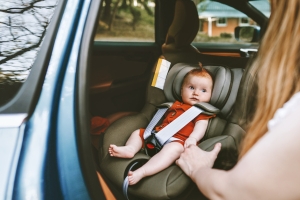Should NH require rear-facing car seats for children under 2 years old?

New Hampshire state law doesn’t require adults to wear seat belts, but the law is not so laissez-faire when it comes to infants. Passengers under age seven must be fastened by a child restraint system (e.g. a car seat) with specific rules spelled out by the federal government. Now, the Legislature is set to vote on SB 118, a bill that would require rear-facing car seats for children less than two years old.
Adding to the current law
RSA 265:107-a is a section of New Hampshire law that addresses how young children must be restrained in motor vehicles. Under this law, children under seven must be “properly fastened and secured by a child restraint system” according to a specific set of safety standards laid out by the United States Department of Transportation. The law doesn’t apply if the child is 57 inches or more in height. Learn more about New Hampshire’s current seat belt laws.
SB 118 adds to this law, stating that persons less than two years of age must be “properly fastened and secured by a rear facing child restraint system which is in accordance with safety standards.”
The penalty for incorrectly using a car seat would be a violation, similar to a speeding ticket, with a $50 fine for a first offense.
Why rear facing car seats?
Those who don’t have children may be surprised by all the distinct categories of child car safety restraints; these include rear-facing car seats, forward-facing car seats, and booster seats. Once a child has graduated from each of these restraints, they are ready to wear a seat belt without additional restraints. The National Highway Transportation Safety Administration has a helpful guide to help you select the proper seat restraints for your child.
Research shows small children are much safer riding backwards. Most fatal collisions impact the front end of the vehicle. When a child is restrained in a rear-facing car seat during such collisions, they are cradled by the car seat rather than being snapped forward. This greatly reduces the risk of serious injury. Plus, children under 2 have more delicate vertebrae than older kids, because they are still converting from cartilage to bone. For this reason, it’s a good idea to keep your toddler in a rear-facing car seat as long as they are still within the manufacturer size specifications, even if they are older than two years old.
A matter of education?
Some argue that a change in the law isn’t necessary. While rear facing car seats are unquestionably safer for infants in most crashes, educating parents on how to protect their children may be a better path forward than making SB 118 into law. There isn’t clear crash data on injuries and car-seat use for children in this specific age group in New Hampshire. This leads some to feel that SB 118 is a government solution where there may not be a significant problem (at least in New Hampshire).
Others worry about the added expenses for poor families. While convertible car seats that can face front or rear can eliminate the need to purchase a special car seat that is only useable for two years, rear-facing car seats are bulky and might mean that larger families have a hard time fitting their kids into smaller cars. Ultimately, opponents of the bill feel that Granite State parents should be trusted to keep their children safe.
What do you think?
This bill was voted “ought to pass” by a 11-9 majority of the House Transportation Committee. Now, it will go to the full House for a final vote. Do you have an opinion on how your representatives should vote on SB 118? Find out who represents you and let them know by visiting our Elected Officials page.











Comments
Login or register to post comments